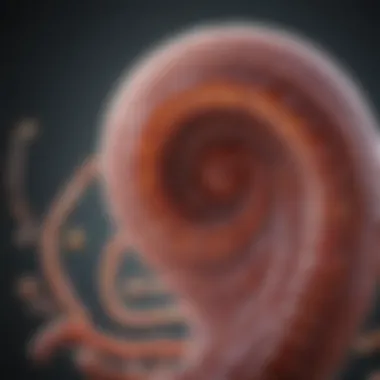Natural Intestinal Parasite Cleanse: Myths and Facts


Research Overview
Natural intestinal parasite cleanses have gained attention in the realms of holistic health and wellness. Parasitic infections can lead to various health issues, prompting individuals to seek out remedies aimed at cleansing the digestive system. This exploration investigates the methodologies, effectiveness, and underlying principles associated with these cleanses.
Preface to the Topic Under Study
The topic of intestinal parasites is complex yet essential for understanding overall health. Parasites can inhabit various parts of the body, particularly the intestines, affecting nutrient absorption and overall wellbeing. This research emphasizes the natural approaches to cleanse the body of these unwanted intruders, examining the reasons behind such cleanses and the natural substances employed in the process.
Summary of Existing Research Findings
Existing studies highlight a range of natural substances believed to aid in detoxifying the body from parasites. Yet, claims can often be exaggerated. Evidence from some research suggests that herbs like wormwood, black walnut, and clove may demonstrate properties that can inhibit parasite growth. However, more comprehensive studies are required to validate these findings effectively and illuminate the real benefits involved.
Key Research Methodology Explained
The methodologies often comprise both qualitative and quantitative analyses, exploring anecdotal accounts and scientific studies. Common practices include:
- Survey Research: Gathering individual testimonials regarding cleansing methods and outcomes.
- Literature Reviews: Analyzing existing scientific literature on specific herbs and their effects on intestinal health.
- Clinical Trials: Examining the impact of natural cleanses on various populations under controlled conditions.
This multi-faceted approach reveals a spectrum of views regarding the efficacy of natural cleanses, enhancing our understanding of the topic.
Health Implications
Discussion on the Impact of the Research on Health
Exploring natural intestinal parasite cleanses offers insights into potential health impacts. Some individuals report feeling rejuvenated after undertaking a cleanse, often attributing improvements in energy levels, digestion, and overall health.
Exploration of Potential Benefits and Risks
While natural cleanses may boast potential benefits, they are not devoid of risks:
- Benefits:
- Risks:
- May increase awareness of gut health.
- Potential for short-term digestive relief.
- Possible nutrient deficiencies due to restrictive cleansing diets.
- Unregulated products may contain harmful substances.
Examples of How the Findings Can Be Applied in Daily Life
For instance, incorporating foods known for their anti-parasitic properties into one's diet, such as garlic or pumpkin seeds, may serve as preventive measures. Understanding these products' roles allows consumers to make informed choices concerning their health.
Well-being Strategies
Practical Tips and Strategies Derived from the Research
Choosing natural cleansing methods requires thoughtful consideration. Here are a few practical tips:
- Research Ingredients: Before trying any cleanse, research the specific herbs or ingredients to understand their effects and potential side effects.
- Consult Professionals: Speak with a healthcare practitioner familiar with herbal medicines to navigate the options effectively.
Advice on Implementing Positive Changes for Well-being
Incorporating a balanced diet rich in fiber and hydration can support the cleansing process. Foods like fermented vegetables can also promote a healthy gut environment.
Personal Stories or Case Studies Supporting the Strategies
Many anecdotes highlight the benefits of integrating specific natural healing practices for optimal digestive health. While these stories should be reviewed critically, they underscore the importance of anecdotal evidence in guiding individuals.
Expert Insights
Analysis of Expert Opinions on the Research Findings
Experts often emphasize the need for skepticism regarding the claims made by natural cleanses. Not all practices are scientifically backed, and caution is advised to ensure that decisions are made based on credible information.
Q&A Session with a Relevant Expert on the Topic
Interviews with experts in holistic health often reveal nuanced perspectives. Questions often revolve around the efficacy of specific natural remedies and the scientific underpinning of their claims. Engaging professionals in this dialogues provides invaluable insights.
Recommended Books, Websites, or Courses for In-depth Learning
Books on holistic health and digestive well-being are recommended. Websites focusing on herbal medicine can also provide deeper insights. Such resources expand the understanding of natural approaches to gut health.


Tools or Apps that Can Assist in Applying the Research Findings
Various apps track food intake and identify ingredients, which can aid individuals in maintaining a balanced diet. This, in turn, supports digestive health and may facilitate the cleansing process.
Understanding Intestinal Parasites
Understanding intestinal parasites is crucial for gaining insights into human health. These organisms, living within the host's intestines, often lead to a range of health issues. By comprehending their nature, symptoms, and risk factors, individuals can take important steps toward prevention, diagnosis, and treatment.
Definition and Types of Intestinal Parasites
Intestinal parasites are organisms that reside in the gastrointestinal tract of humans and other animals. There are several kinds of these parasites, which can be broadly categorized into two groups: protozoa and helminths. Protozoa, like Giardia lamblia and Entamoeba histolytica, are single-celled organisms. They can contaminate food or water, leading to significant gastrointestinal distress. Helminths, on the other hand, are larger, multi-cellular organisms such as roundworms, tapeworms, and flukes. Each type has its own life cycle and mode of transmission, often linked to poor hygiene practices or consuming undercooked food. Understanding these definitions and types is essential for recognizing potential risks.
Common Symptoms of Infestation
The symptoms of intestinal parasite infestation can vary widely. Some individuals may be asymptomatic, while others experience significant digestive disturbances. Common symptoms include:
- Abdominal pain or discomfort
- Diarrhea or constipation
- Nausea and vomiting
- Unexplained weight loss
- Fatigue or weakness
- Changes in appetite
These signs can sometimes be mistaken for other gastrointestinal issues. Therefore, awareness of these symptoms is important for early identification and intervention.
Risk Factors for Infection
Several factors can increase the likelihood of intestinal parasite infections. These include:
- Traveling to areas with poor sanitation: Individuals traveling to tropical or underdeveloped regions are at higher risk.
- Consuming contaminated food or water: This includes consuming raw or undercooked meats, as well as untreated water sources.
- Poor hygiene practices: Inadequate handwashing can facilitate the spread of parasites.
- Immune system status: Those with weakened immune systems are more vulnerable to parasitic infections.
Understanding these risk factors plays a critical role in prevention efforts and overall health management. By recognizing how parasites operate and where they thrive, individuals can better protect themselves.
The Concept of Cleansing
Cleansing, particularly in the context of intestinal health, is often misunderstood. The topic plays a vital role in this discussion, as it encompasses both historical beliefs and modern practices. Understanding cleansing is essential to appreciating its potential benefits and limitations when dealing with intestinal parasites.
Historical Context of Cleansing Practices
Throughout history, various cultures have developed cleansing practices, often rooted in traditional medicine. Ancient Egyptians used herbs and dietary changes to promote gut health. Similarly, Ayurvedic medicine in India emphasizes the importance of detoxification to maintain balance within the body.
In medieval Europe, the concept of cleansing was common, often linked to physical and spiritual well-being. People believed that clearing the body of impurities could prevent diseases. This historical context illustrates that cleansing has been a longstanding practice, reflecting humanity's quest for health and wellness.
Theoretical Foundations of Parasite Cleansing
The theoretical basis for parasite cleansing rests on the assumption that specific compounds can eliminate harmful organisms without harming the host. This stems from a blend of herbal knowledge and an understanding of gut microbiota. Researchers are looking into phytochemicals, like those found in garlic and wormwood, which have shown potential antiparasitic effects.
Studies have begun to investigate how these natural compounds act at the cellular level, targeting parasites more effectively than some conventional methods. However, it is crucial to approach these theories with a discerning mindset, recognizing that not all claims are supported by scientific evidence.
Distinction Between Conventional and Natural Methods
Conventional methods of cleansing often involve pharmaceuticals, which may provide rapid solutions but come with possible side effects. In contrast, natural methods focus on holistic interventions like dietary changes, herbal remedies, and lifestyle adjustments. Natural cleansing aims to restore balance gradually rather than forcefully eliminate parasites.
Natural methods promote the body's self-cleansing abilities. They may take longer to yield results but are often seen as more sustainable. This distinction encourages individuals to weigh both options and choose what aligns best with their health philosophies and goals.
"A well-informed decision requires understanding the spectrum of available methods and their implications for overall health."
Natural Approaches to Intestinal Parasite Cleanse
Natural approaches to intestinal parasite cleansing are crucial in this discussion as they provide alternatives to conventional methods. Given the rising interest in holistic health, understanding these approaches can illuminate effective strategies for detoxification. Such methods encompass dietary changes, herbal remedies, and lifestyle adjustments. Together, they operate on the principle of enhancing the body's natural ability to eliminate unwanted pathogens.
Herbal Remedies: An Overview
Herbal remedies play a significant role in natural parasite cleansing. These remedies harness the properties of plants known for their detoxifying and antimicrobial effects.
Common Herbs for Cleansing
Common herbs used in this context include wormwood, black walnut, and cloves. Each herb possesses unique characteristics. For instance, wormwood is noted for its bitter compounds, which stimulate digestion and may help expel parasites. Black walnut hulls contain juglone, an active ingredient that is believed to have antiparasitic properties. Cloves, on the other hand, are appreciated for their ability to kill parasite eggs.
These herbs are popular choices because they can often be used in various forms, including teas, tinctures, and capsules. However, they can be potent, and each individual's response may vary, which leads to some risk in their use, especially regarding dosage and method of administration.
Mechanisms of Action
The mechanisms of action for these herbs are diverse. Many of them work by creating an unfavorable environment for parasites, making it difficult for them to survive. For example, the bitter compounds in wormwood stimulate bile flow, which can aid in fat digestion and create a less hospitable environment for parasites.


This mechanism enhances the overall goal of cleansing by helping the body utilize its natural detoxification pathways more efficiently. However, while effective for some, others may experience digestive discomfort or allergic reactions, underscoring the need for careful consideration.
Dosage and Administration
Dosage and administration of herbal remedies are key factors for their success. Proper dosage ensures that one takes enough to achieve the desired effect without suffering adverse effects. Often, herbal supplements may vary in potency. Therefore, consulting with a health professional before starting any regimen is advisable.
Most herbal cleanses recommend starting with lower doses to assess tolerance before gradually increasing. The administration could also vary—some individuals prefer teas, while others may opt for capsules. Such versatility allows for tailoring the approach, but attention to personal preference and body response remains important.
Dietary Considerations
Making dietary changes can substantially enhance the effectiveness of a parasite cleanse. Foods rich in fiber, probiotics, and certain enzymes support the body’s detoxification processes.
Foods that Support Detoxification
Foods such as garlic, pumpkin seeds, and fermented vegetables are thought to support detoxification. Garlic, for instance, has natural antiparasitic properties and boosts the immune system.
Pumpkin seeds contain cucurbitacin, which may immobilize parasites and facilitate their expulsion from the gut. Fermented foods like sauerkraut enhance gut health by providing beneficial probiotics, supporting detoxification as well. Incorporating these foods into one’s diet encourages a natural cleansing vibe, but it requires commitment and consistency.
Foods to Avoid During Cleansing
When undergoing a cleanse, it is also vital to avoid certain foods that might hinder progress. Processed foods, sugar, and excessive red meats should generally be minimized. Such foods can contribute to inflammation and disrupt digestion, providing a more hospitable environment for parasites.
Additionally, dairy products may cause mucus buildup, which can impede thorough detoxification. Awareness of these dietary elements is essential for maximizing the effectiveness of a cleanse.
Lifestyle Factors Impacting Cleansing Efficacy
Beyond diet, several lifestyle factors can enhance or diminish the effectiveness of a cleansing routine.
Hydration
Hydration is fundamental when engaging in any cleansing process. Adequate water intake supports kidney function and helps in flushing out toxins. The body relies on water to maintain systemic balance and facilitate metabolic processes. Dehydration can hinder these processes, making it harder for the body to remove parasites.
Therefore, ensuring a consistent intake of water is crucial during a cleanse.
Physical Activity
Regular physical activity also plays an integral role. Exercise increases circulation and can coordinate detoxification pathways, thereby improving overall health. Movement encourages digestion and can help mobilize and eliminate any parasites effectively. Thus, incorporating a mix of aerobic and strength training activities can be beneficial for those attempting to cleanse.
Stress Management
Finally, stress management has a significant impact on cleansing. Chronic stress can impair digestion and immune function, making it difficult for the body to detoxify effectively. Techniques such as meditation, yoga, or simple breathwork can create a more favorable environment for the cleansing processes. Thus, fostering a calm state contributes positively to overall health and the success of a cleanse.
Being aware of these lifestyle factors is as important as the actual cleansing methods employed; each aspect complements the other, aiming for holistic well-being.
Practical Steps for Implementing a Cleanse
Implementing a natural cleanse requires careful consideration and strategic planning. Practical steps play a crucial role in navigating this process effectively. A structured approach not only maximizes potential benefits but also minimizes risks. Understanding these practical steps is essential, as they help individuals address their specific health needs and achieve desired outcomes.
Assessing the Need for a Cleanse
One of the first steps in the cleansing process is assessing whether a cleanse is necessary. This self-evaluation can guide individuals in understanding their condition and expectations for the cleanse.
Self-Assessment Tools
Self-assessment tools are valuable resources for determining the need for a cleanse. These tools can include questionnaires and symptom checklists designed to evaluate gastrointestinal health. They typically focus on common symptoms associated with parasite infestations, such as bloating, digestive discomfort, and fatigue. The key characteristic of these tools is their accessibility, allowing users to conduct assessments in privacy and convenience.
However, while they offer a beneficial starting point, self-assessment tools have some limitations. Their accuracy depends largely on personal interpretation of symptoms and knowledge about parasites. Overreliance on these tools could lead to inappropriate conclusions regarding the need for a cleanse.
Consulting Health Professionals
Consulting with health professionals is another significant aspect of assessing the need for a cleanse. Health professionals, such as doctors or nutritionists, can provide insights based on medical expertise and experience. This choice is beneficial because professionals can interpret symptoms through a clinical lens, ensuring accurate assessments.
The unique feature of consulting health professionals is the access to diagnostic tools and tailored advice. They may offer lab tests to confirm any parasitic infections or recommend specific cleansing methods suited to an individual’s health profile. However, this option may also present disadvantages, such as costs associated with consultations or tests. Nonetheless, the professional insight can, in many instances, provide a more thorough understanding than self-assessment alone.
Developing a Cleansing Plan
After assessing the need, developing a thorough cleansing plan is vital. A well-structured plan can lead to successful outcomes and enhance the overall experience of the cleanse.
Setting Goals


Setting clear goals is a critical step in creating a successful cleansing plan. Goals provide direction and define what the individual hopes to achieve through the cleanse, whether it is detoxification, improved gastrointestinal health, or increased energy levels. The key aspect of establishing goals is their role in motivation; clear objectives can inspire commitment to the cleanse.
A unique feature of setting goals is flexibility. Individuals can adjust their goals as they progress through the cleansing process, allowing for dynamic changes based on how the body responds. However, unrealistic goals could lead to disappointment and a sense of failure if not achieved, highlighting the need for setting achievable targets.
Choosing the Right Methods
Choosing the right methods for cleansing is equally important. Various natural techniques are available, such as herbal remedies, dietary adjustments, or lifestyle changes. The distinctive aspect of this choice lies in personal preference and health requirements. Different methods suit different individuals, depending on their specific health situations or tolerance levels.
However, the diversity of methods can also lead to confusion. Without guidance, individuals may struggle to determine the most suitable approach for them. Therefore, adequate research and, if possible, professional advice may help in selecting effective methods, optimizing the cleanse's impact.
Monitoring Progress
Monitoring progress throughout the cleanse allows individuals to understand the effectiveness of the chosen methods and assess their body's response.
Tracking Symptoms
Tracking symptoms serves as an essential tool for evaluating how the body reacts during the cleanse. Journaling symptoms can reveal patterns and changes that track improvement or highlight adverse reactions. This method offers a simple yet beneficial way to stay attuned to one’s health.
The unique feature of symptom tracking is personalized feedback. Individuals can make necessary adjustments based on their observations, enhancing the efficiency of the cleansing plan. However, it is important to remember that fluctuations in symptoms can occur, and monitoring them should be conducted with a balanced perspective.
Adjusting the Plan as Necessary
Finally, adjusting the plan as necessary is a crucial component of the cleansing process. Being aware of the need to adapt can lead to more effective outcomes and a more comfortable experience. If certain methods do not yield the expected results, modifying them or integrating new techniques can better suit changing health conditions.
The key characteristic of this adaptability is responsiveness. Adjustments can reflect the body's feedback and ensure alignment with its evolving needs. However, frequent changes without proper assessment might create complications, leading individuals away from their original goals. Thus, it’s essential to strike a balance between flexibility and consistency during the cleansing journey.
Potential Risks and Considerations
Understanding the potential risks and considerations associated with natural intestinal parasite cleanses is essential for anyone looking to pursue these methods. While the goal may be to enhance health and eliminate unwanted parasites, it is crucial to recognize that not all cleanses are safe or effective. A careful assessment of individual health status, the methods employed, and potential side effects can offer a fuller picture of what a cleanse entails.
Adverse Effects of Natural Cleanses
Possible Side Effects
Natural cleanses can bring several side effects. The most common ones include digestive issues such as diarrhea, constipation, or nausea. These are direct results of the herbs or dietary changes involved in the cleansing process. Another notable side effect is dehydration, which can arise if one does not drink enough fluids while cleansing. Understanding these side effects is vital. They are often viewed as temporary responses to the cleansing process. However, their duration and intensity can vary widely among individuals. Therefore, careful monitoring during a cleanse is necessary to mitigate risks.
Due to their potential negative impacts, it is crucial to be aware of the specific reactions that can occur. For instance, herbal products can also trigger allergic reactions in some people, which can complicate the cleansing process further. Recognizing these aspects of possible side effects makes it easier to gauge whether or not one should continue with the cleanse or seek adjustments as necessary.
When to Seek Medical Advice
Seeking medical advice is critical if adverse symptoms arise during or after a cleanse. Symptoms such as severe abdominal pain, persistent vomiting, or extreme fatigue should not be overlooked. They can indicate an underlying issue that a cleanse might exacerbate rather than alleviate. Many people might dismiss these symptoms believing they are just part of the cleansing phase.
However, they may require immediate attention. Consulting a health professional ensures that one does not mistakenly overlook a more serious condition that requires urgent care. Being proactive in such situations can prevent more severe complications and direct the individual towards healthier practices.
Misconceptions about Parasite Cleansing
Common Myths Debunked
Several misconceptions about parasite cleansing can mislead individuals. One common myth is that all natural cleanses are completely safe. This belief can lead to harmful practices, particularly if people ignore their unique health conditions. Not every natural remedy is suitable for everyone, and sweeping generalizations can be dangerous. Another myth is that the presence of some symptoms directly indicates a parasitic infection. Many gastrointestinal symptoms can originate from non-parasitic causes, which further complicates self-diagnosis. Being aware of these myths aids in fostering a more accurate understanding of what any cleanse entails, and helps in making informed decisions.
Understanding Limitations
Understanding limitations is equally important as debunking myths. Natural cleanses may not effectively eliminate all parasites. Research has shown that while some natural methods seem effective, they are not foolproof. Moreover, certain cleanses might not address the root causes of infection or imbalance in the body. Recognizing these limitations helps to set realistic expectations. A cleanse should never replace conventional medical treatment when it is warranted. A balanced approach that incorporates both traditional medical advice and natural methods can lead to better overall health outcomes.
"The journey of cleansing the body is not just about removing parasites; it involves understanding deeper health principles."
The End: A Balanced Perspective on Natural Cleansing
Understanding natural parasite cleansing allows individuals to make educated decisions about their health. This section emphasizes the critical elements and advantages of integrating such practices into a broader health regimen. Natural cleanses can offer potential benefits but come with important considerations. Not all cleansing methods suit everyone, nor do they guarantee results.
Integrating knowledge into everyday practice is essential for achieving holistic well-being. Individuals need to discern what methods align with their health goals and understand the limitations of these cleanses. It is essential to approach natural cleansing not as a cure-all but rather as a component of a balanced health strategy.
"Natural cleansing practices can be beneficial, but they should not replace medical advice or treatment."
Integrating Knowledge into Practice
To effectively use knowledge gained from research on natural parasite cleanses, one must assess personal health needs critically. Here are some steps to root knowledge in practice:
- Educate Yourself: Understanding herbal remedies and dietary considerations is fundamental. Knowledge of how various herbs function can guide choices in selecting remedies.
- Create a Plan: Formulate a comprehensive cleansing plan based on individual health assessments and personal goals. Clearly defined objectives can streamline the cleansing process and optimize effectiveness.
- Evaluate Timelines: Determine a timeframe for the cleanse and set realistic expectations about outcomes. It is important not to rush the process, as natural methods may take time to show benefits.
- Maintain a Balanced Diet: Incorporate foods that support detoxification while avoiding those that may hinder the cleansing process.
Future Directions for Research
Research on natural intestinal parasite cleanses remains critical. Future studies should focus on:
- Efficacy Studies: Rigorous clinical trials assessing the effectiveness of various natural cleansing methods can offer concrete evidence to support their use.
- Safety Assessments: Investigating potential adverse effects and contraindications related to specific herbs or practices can protect consumers.
- Case Studies: Individual case studies can shed light on personal experiences with natural cleanses, offering insights into their practical application.
- Comparative Analyses: Comparing traditional medical approaches to natural methods could provide a clearer perspective on the advantages and limitations of each.



